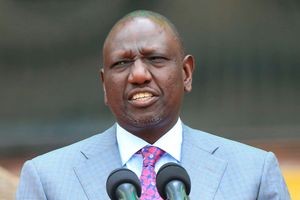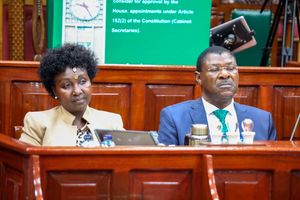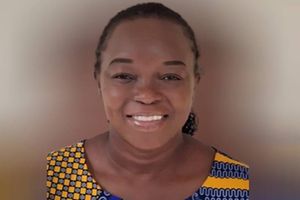
President William Ruto (left) and his first batch of Cabinet nominees.
The National Assembly Committee on Appointments had by Monday evening cleared the 20 Kenyans nominated by President William Ruto for appointment as Cabinet Secretaries in a draft report.
The committee chaired by House Speaker Moses Wetang’ula is, however, expected to meet on Wednesday, August 7, morning to approve and sign the report recommending the appointment of the nominees before it is tabled in the House during its morning session for debate.
The report will be debated during the afternoon session.
Initially, the committee appeared divided on two nominees- (immediate former Kakamega Governor Wycliffe Oparanya over his investigation issues with the Ethics and Anti-Corruption Commission (EACC) and Ms Stella Langa’t over her below-par performance when she appeared before the committee).
The initial disagreements saw a faction of the committee members led by Suna East MP Junet Mohamed storm out of the committee’s meeting protesting against the proposed rejection of Mr Oparanya.
The committee would later meet following consultations from “other government quarters” and agreed that all the nominees be recommended for approval.
“Unless something changes, the committee, presently, is of the view that all the nominees’ merit appointment into the dockets nominated to,” said one of the committee members, who did not wish to be quoted.
The vetting rules are such that a committee’s chairperson is its sole spokesperson.
If the committee sticks to its position on the nominees, the onus will squarely lie in the hands of the House sitting at the plenary to either agree with its recommendations or reject them.
The report will be presented to the House after a gruelling four-day vetting exercise that ended on Sunday.
The approval of the CS nominees was made despite some of them not performing well during the oral interviews when they appeared before the vetting committee.
This even as the Speaker Wetang’ula-led committee established that all the President’s nominees met the requisite minimum qualifications to be appointed as Cabinet Secretaries as they did not have questionable academic papers.
The Public Appointments (Parliamentary Approval) Act guided the vetting exercise of the CS nominees.
“A committee shall consider a nomination and table its report in the relevant House for debate and decision within fourteen days from the date on which the notification of nomination was given,” the Act states.
Section 6 (7) of the Act states that an approval hearing shall focus on a candidate’s academic credentials, professional training and experience, personal integrity and background.
The Act also mandates the vetting committee to consider the suitability of the nominee for the appointment proposed having regard to whether the nominee’s abilities, experience and qualities meet the needs of the body to which the nomination is being made.
Prepare a report
“At the conclusion of an approval hearing, the committee shall prepare a report on the suitability of the candidate to be appointed to the office to which the candidate has been nominated and shall include in the report, such recommendations as the committee may consider necessary.”
The nominees to be approved by the House for appointment include immediate former Speaker of the National Assembly Mr Justin Muturi (Public Service and Human Capital Development), Mr Aden Duale Environment, Climate Change and Forestry), Mr John Mbadi (National Treasury and Economic Planning) and Mr James Wandayi (Energy and Petroleum).
The others are Ms Rebecca Miano (Tourism and Wildlife), Mr Ali Hassan Joho (Mining, Blue Economy and Maritime Affairs), Mr Wycliffe Oparanya (Co-operatives and Micro, Small and Medium Enterprises (MSMEs) Development) and Stella Lang’at (Gender, Culture, The Arts and Heritage).
Also vetted include Dr Debra Mulongo Barasa (Health), Dr Andrew Mwihia (Agriculture and Livestock Development), Mr Eric Mugaa (Water, Sanitation and Irrigation), Dr Margaret Ndung’u (Information, Communication and Digital Economy), Ms Alice Wahome (Lands, Public Works, Housing and Urban Development).
Mr Salim Mvurya (Investments, Trade and Industry), Ms Soipan Tuya (Defense), Mr Julius Ogamba (Education), Prof Kithure Kindiki (Interior and National Administration), Mr Davis Chirchir (Roads and Transport), Mr Kipchumba Murkomen (Youth Affairs, Creative Economy and Sports) and Mr Alfred Mutua (Labour and Social Protection) were also vetted.
The law says that if after the expiry of the period for consideration of the nominees, Parliament has neither approved nor rejected a nomination of a candidate, the candidate shall be deemed to have been approved.
Seven days
Where the nomination of a candidate is rejected by Parliament, the appointing authority may submit to the relevant House the name of another candidate and the procedure for approval as specified in the law shall apply accordingly.
In terms of notification of the decision of the House, the Clerk shall notify the appointing authority of the decision of the relevant House of Parliament within seven days of the decision.
The issues that the committee was required to ascertain include letters or certificates of compliance from the Ethics and Anti-Corruption Commission and Higher Education Loans Board.
The others are clearances from the Office of the Registrar of Political Parties, Directorate of Criminal Investigations, Kenya Revenue Authority, Commission for University Education and at least one Credit Reference Bureau.








